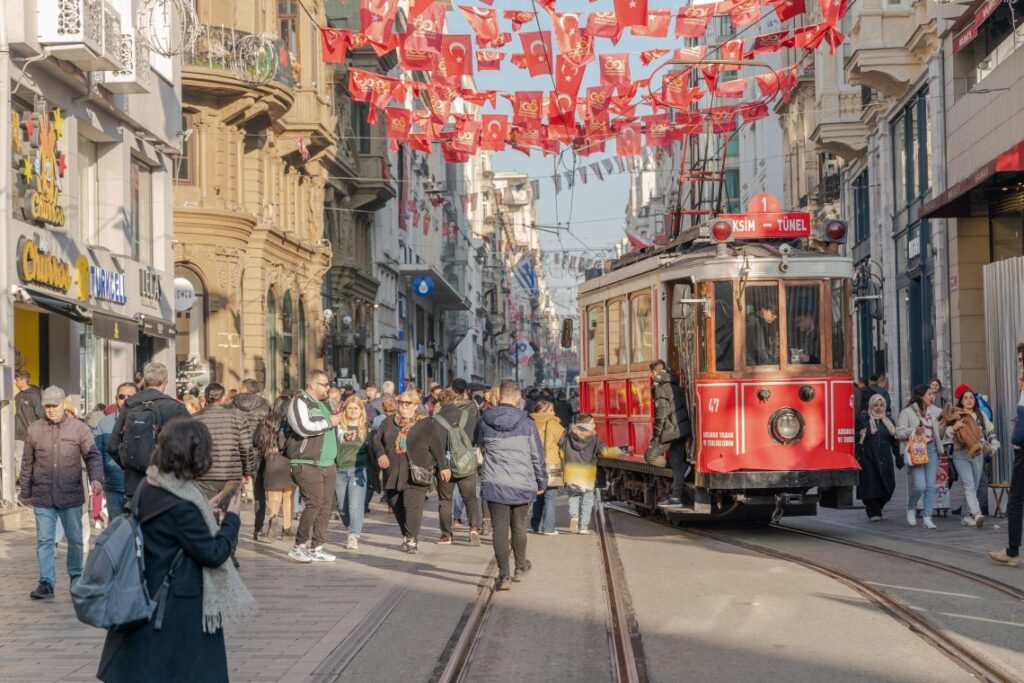President Recep Tayyip Erdogan aims to revive the economy by returning the country to traditional policies and partnerships with the West.
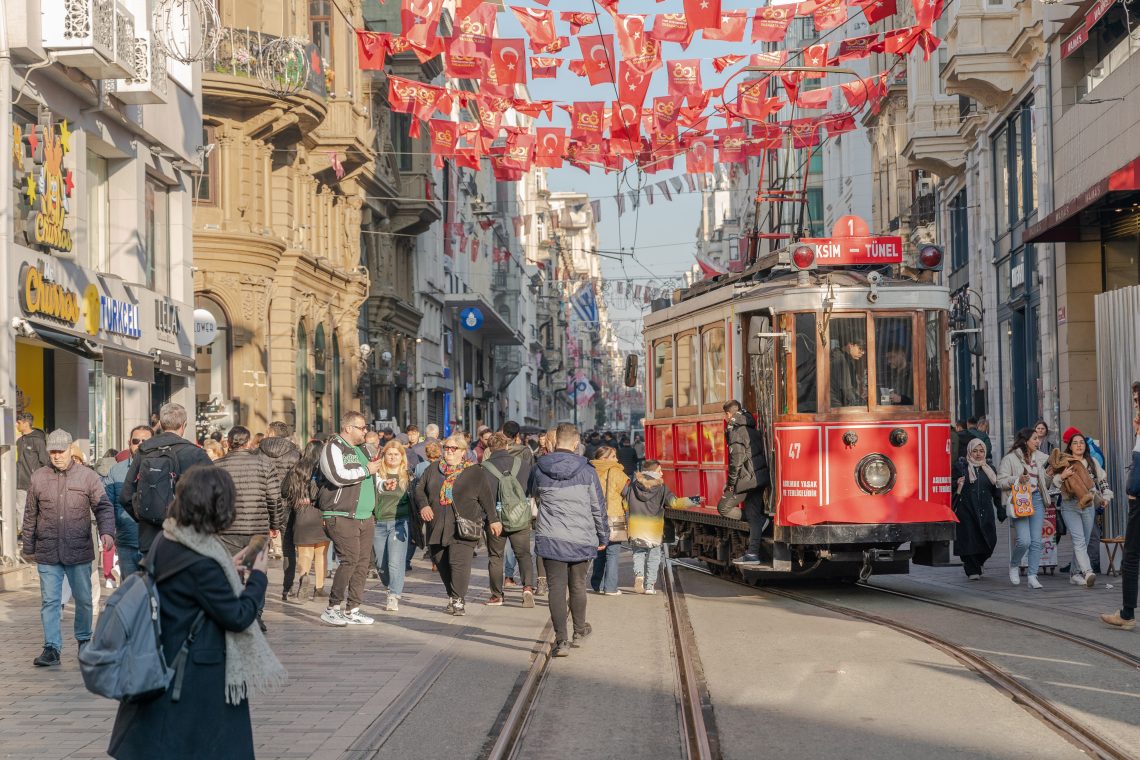 A tram passes shoppers on Istiklal Street in Istanbul, Turkey, on December 19, 2023. Since his re-election in May 2023, President Recep Tayyip Erdogan has abruptly reversed policy direction to curb inflation and restore confidence in the economy. ©Getty Images×
A tram passes shoppers on Istiklal Street in Istanbul, Turkey, on December 19, 2023. Since his re-election in May 2023, President Recep Tayyip Erdogan has abruptly reversed policy direction to curb inflation and restore confidence in the economy. ©Getty Images×
In a nutshell
Re-elected President Recep Tayyip Erdogan aims to reduce inflation and restore investor confidence He is likely to realign both economic and foreign policy closer to the West It is unclear what he wants to achieve with the new Turkish constitution
Turkish President Recep Tayyip Erdogan, who will be re-elected in May 2023 for a third five-year term, is seeking to curb inflation and fix the struggling economy in the Middle Eastern country of 85 million people. It was decided to adopt a conventional economic policy. He has the political capital to sustain change. Not only did Mr. Erdogan win with 52% of the vote, his coalition government, the People’s Union, led by his Justice and Development Party (AKP) also won a majority in parliament.
First, as part of the reforms, the president appointed a new economic team. The team includes Vice President Cevdet Yilmaz, Central Bank Governor Hafizé Gae Erkan, and Finance Minister Mehmet Simsek. However, Erkann recently resigned and the newly appointed Fatih Karahan is expected to continue the same policies.
The new team has the difficult task of restoring investor and consumer confidence. Turkey’s inflation rate is expected to average 66% through 2024, according to a September forecast by the Turkish Economic Policy Research Institute (TEPAV). This is one of the highest inflation rates in the world, helped by the central bank’s unconventional low interest rate policy ahead of the election. The government’s target inflation rate is 36% by the end of the year. Popular among foreign investors, Simsek and other members of the economic team quickly adopted orthodox economic policies.
Turkey returned to the dollar bond market in November 2023 for debt financing, securing $2.5 billion in its first deal. Since the May 2023 elections, Turkey’s central bank has raised interest rates from 8.5% to 45%. The results have not yet slowed inflation, but are raising hopes that it will eventually have an effect. In mid-January, Moody’s Investors Service upgraded the country’s outlook from stable to positive, citing “definitive changes” in economic policy. Some experts expect inflation to moderate, despite the recent 49% increase in the minimum wage.
Second, President Erdoğan has repeatedly stated that membership in the European Union is Turkey’s strategic priority, a declaration that was greeted with incredulity by European partners. But it has become Ankara’s new motto only because a return to rational economic policy must be accompanied by a return to the West in the orientation of Turkey’s foreign policy.
Third, President Erdoğan began talking about the need for a new civil and democratic constitution based on domestic consensus, a shift from the usually contentious Turkish politics.
×
facts and figures
Türkiye’s interest rate hikes have not yet cooled inflation
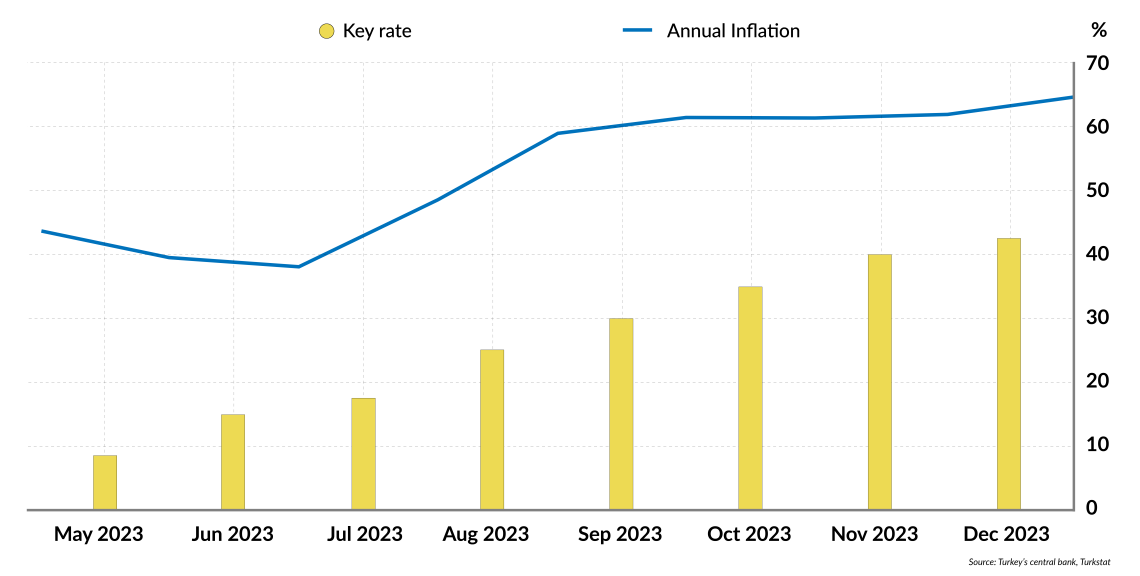 Turkey’s central bank raised its key interest rate to 45% on January 25, 2024, but the inflation rate remains at around 65%.
Turkey’s central bank raised its key interest rate to 45% on January 25, 2024, but the inflation rate remains at around 65%.
How did the era of irrational economics begin and why did it end?
It all started after the Islamic State group laid siege to Kobani in northern Syria in 2015, killing 120 civilians. Until the Kobani massacre, Turkey was part of an alliance, including the United States, against Syrian President Bashar al-Assad. After Kobani, Turkey’s allies broke away from Ankara and established a new headquarters in Syria with the U.S.-aligned Kurdish fighters YPG. Turkey considers the YPG to be a terrorist organization indistinguishable from the Kurdish PKK, which is officially considered a terrorist organization by Western countries.
This rupture made Turkey a foreign policy spoiler from the Western perspective, not only in Syria but throughout the Eastern Mediterranean. The situation worsened with the creation in 2019 of the Eastern Mediterranean Gas Forum, a multinational group that excluded Turkey.
A prominent feature of the Turkish economy is the savings deficit, which requires Turkey to rely on the US dollar market to cover the current account deficit. However, former US President Donald Trump’s threat to destroy Turkey’s economy if it takes unspecified “no-go” actions in Syria has fueled Ankara’s fears and prompted the country to cut ties with the dollar market. became. To achieve this, Turkey was required to abolish its credit exchange facility with London and bring Turkish gold back to its own country.
The era of irrational economic policy began, and with the development of the situation in Syria, it also extended to the realm of foreign policy. As a result of this situation, Turkey, a NATO member, was unable to keep pace with Western countries and was forced to pursue its own path.
The grievances may have been legitimate, but they led to harmful government economic policies that Turkey is still trying to undo. Countries that are chronically in need of capital cannot be separated from the US dollar market. Russia, China, and the Gulf states are no substitute for orderly Western markets.
×
facts and figures
Turkish lira plummets
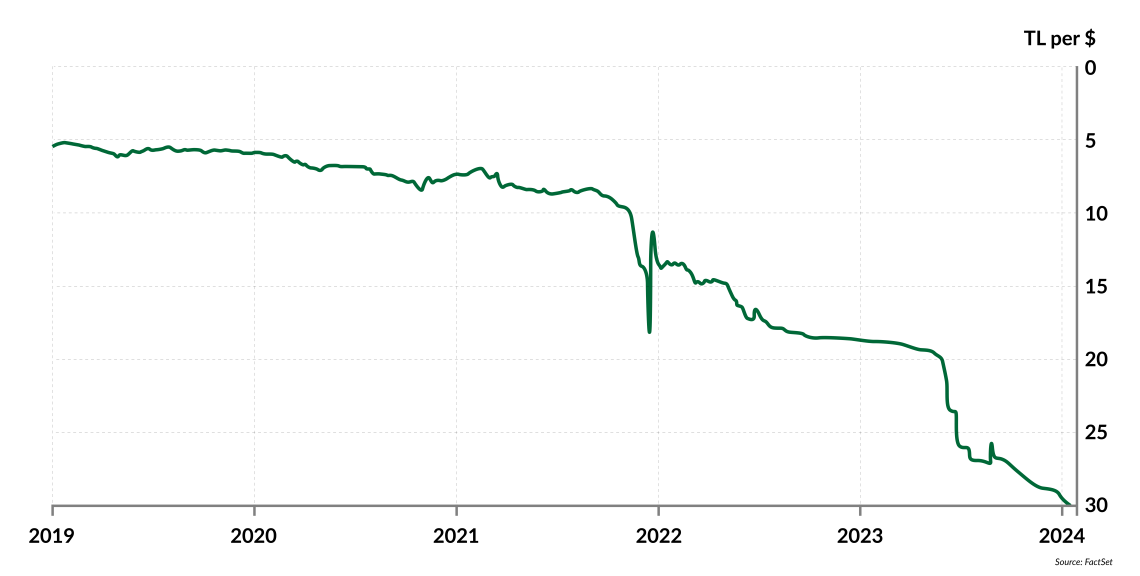 The Turkish lira is one of the world’s worst-performing currencies, falling to as low as $30 against the dollar in January 2024. @GIS
The Turkish lira is one of the world’s worst-performing currencies, falling to as low as $30 against the dollar in January 2024. @GIS
Turkey knows well
Turkey was one of the first developing countries to design and implement financial liberalization measures in the 1980s, when the nature of financial flows between countries began to change. Prior to the 1980s, funds were transferred between governments, but there has since been a shift to market-based transactions. Recognizing major changes, Turkey was one of the first countries among developing countries to establish and liberalize financial markets. This meant not only developing orderly government debt instruments and stock markets, but also opening financial markets to foreign participants and allowing convertibility of the Turkish lira.
The damage caused by recent unconventional economic policies was apparent even before the May 2023 elections. Combined with the electoral dynamics, the country saw a rapid rise in inflation and a rapid deterioration in both the current account and budget deficits. Today’s policy shift is just one of the steps needed to stabilize Turkey’s economy.
Türkiye’s solid economic potential
Turkey is a developed country with diverse manufacturing bases, with a nominal gross domestic product of over $1.1 trillion in 2023, ranking 17th among countries. Its economic transformation is largely due to her close ties with the EU. About 95 percent of Turkey’s exports are manufactured products, of which about 53 percent go to G7 countries. Close cooperation with Western countries transformed the sleepy agricultural nation of the 1960s into a dynamic industrial nation in the 2020s.
A balance of payments crisis in an industry-based economy is more harmful than a balance-of-payments crisis in a resource-based economy like Argentina. In Turkey’s case, the country’s earning power requires it to hold foreign currency at the beginning of the production cycle to be able to pay for imports. For countries like Turkey, the inability to procure imports or repay debts can lead to mass unemployment and rampant inflation.
However, care must be taken to untangle the web of irrational policy measures. Given the weak lira, which is trading at record lows against the dollar, demand for hard currency could surge overnight. Gradualism would lessen the shock, but would increase the risk of growing impatience among the public and political elites as new local elections approach in March 2024.
×
facts and figures
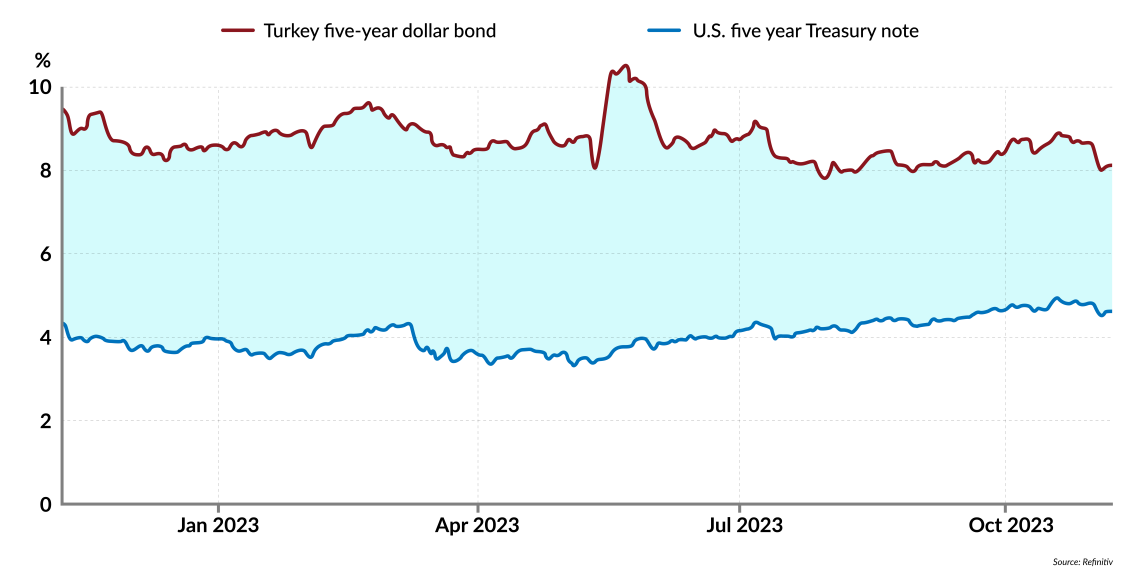 The premium investors demanded for Turkish government bonds soared at the height of uncertainty over the May 2023 elections. ×
The premium investors demanded for Turkish government bonds soared at the height of uncertainty over the May 2023 elections. ×
scenario
More likely: Erdogan will stick to economic orthodoxy, the EU and a new constitution
Local elections are coming up in Türkiye in March 2024. President Erdoğan’s AKP was defeated in local elections in 2019, particularly in large cities such as Istanbul, Ankara and Antalya. If their aim is to start a rapid economic recovery, especially in urban areas, in time for the March vote, the administration is running out of time to introduce a new gradual economic policy framework. . These measures may be effective if they create positive expectations for the economy, such as lower inflation.
Retaining the EU as Turkey’s strategic priority could also boost positive economic expectations. The sooner Western partners begin engaging with Turkey, the higher the expectations will be.
The new constitution could be part of Erdoğan’s attempt to find a new coalition partner in parliament, which will last until the next presidential election in 2028. New allies may be needed in the expanding coalition to carry out the policy shifts that have taken place since the 2023 elections. Parliament. Discussions over a new civilian constitution may soon gather new partners, perhaps in the immediate aftermath of local elections.
Unlikely: Erdogan intends to remain president beyond 2028
The debate over the new constitution could also be a means for Erdoğan to extend his term as president. The president’s last constitutional term ends after the 2028 election, so he will likely seek a new term with a new constitution. But such a power grab would unite an otherwise fractured opposition party. If it were up to voters in metropolitan areas, Mr. Erdoğan would not be Turkey’s president today. Therefore, he will not take any risks to maintain his power.
Contact us for industry-specific scenarios and bespoke geopolitical intelligence. We provide detailed information about our advisory services.

Sign up for newsletter
Get insights from our experts in your inbox every week.


